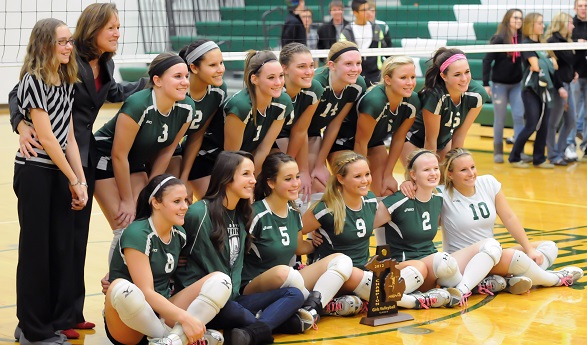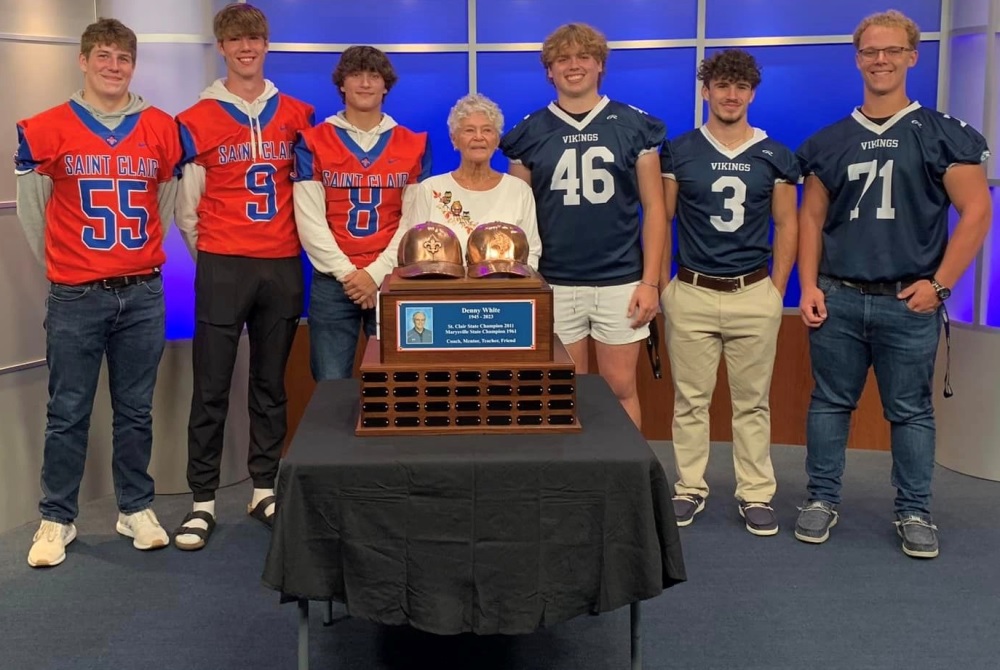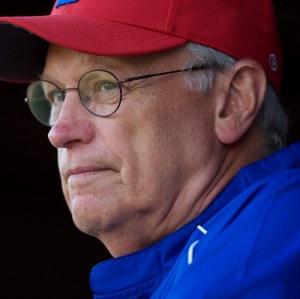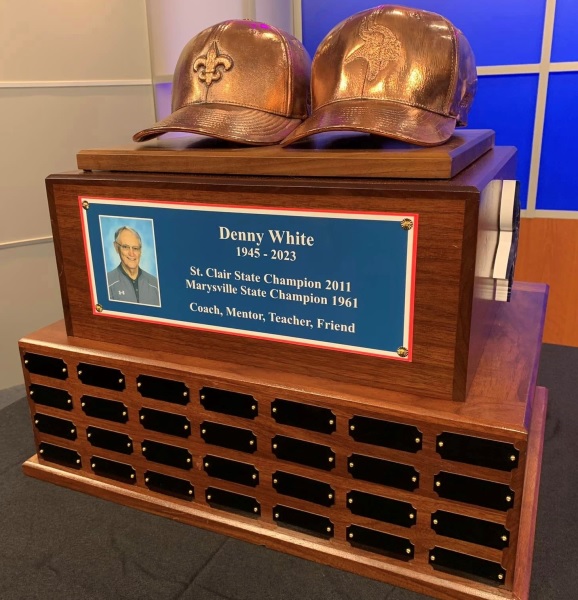
Wise Words for Coaches New (and Old)
September 13, 2013
By Geoff Kimmerly
Second Half editor
Every fall brings a new beginning for those who live by the high school calendar. And among those experiencing a new start are first-year high school coaches eager to begin their careers in educational athletics.
But what knowledge do they bring into their first coaching jobs? Most if not all played at the high school level, and many played at the college level as well. Some have served as assistants or coached youth teams. But high school coaching comes with its own set of challenges requiring an advanced set of skills – skills that are passed on annually as part of the Michigan High School Athletic Association’s Coaches Advancement Program.
To assist in giving some of our new coaches a running start, we tapped into the knowledge of three of our Coaches Advancement Program instructors for advice they give those just starting out:
 Jean LaClair began this fall 12th in MHSAA volleyball history with 861 wins since becoming a varsity head coach in 1987. She’s coached at Midland Dow, Pinconning and currently Bronson, where she’s also the athletic director and an assistant principal. She’s also served as an MHSAA official and contributed to the Women in Sports Leadership porgram.
Jean LaClair began this fall 12th in MHSAA volleyball history with 861 wins since becoming a varsity head coach in 1987. She’s coached at Midland Dow, Pinconning and currently Bronson, where she’s also the athletic director and an assistant principal. She’s also served as an MHSAA official and contributed to the Women in Sports Leadership porgram.
 Ken Semelsberger is a recent inductee into the Michigan High School Football Coaches Hall of Fame and spent 33 years at Port Huron High School as a coach and athletic administrator. He also coached football at Detroit Servite and has led teams in basketball, softball and baseball. Semelsberger returned to the Port Huron sideline four seasons ago as the varsity’s line coach.
Ken Semelsberger is a recent inductee into the Michigan High School Football Coaches Hall of Fame and spent 33 years at Port Huron High School as a coach and athletic administrator. He also coached football at Detroit Servite and has led teams in basketball, softball and baseball. Semelsberger returned to the Port Huron sideline four seasons ago as the varsity’s line coach.
 Penny Allen-Cook currently is an athletic consultant and in her fourth season coaching the Freeland varsity volleyball team. She also coached volleyball at Alma College, and is a former assistant commissioner of the Great Lakes Intercollegiate Athletic Conference. She served as an assistant athletic director at Alma College and director of compliance at Saginaw Valley State University.
Penny Allen-Cook currently is an athletic consultant and in her fourth season coaching the Freeland varsity volleyball team. She also coached volleyball at Alma College, and is a former assistant commissioner of the Great Lakes Intercollegiate Athletic Conference. She served as an assistant athletic director at Alma College and director of compliance at Saginaw Valley State University.
All were asked the following questions during separate interviews. But not surprisingly, some of their answers were similar – especially those that emphasized dealing with parental pressures and why they as coaches continue to return to the sideline every year.
Many of their answers also segued well into each other, so we’ve blended them for one longer conversation filled with wisdom beneficial to new and veteran coaches alike.
What do you tell those who are interested in becoming high school coaches?
Semelsberger: “Basically, it’s one of the most fulfilling things you’ll ever do. And it’s also one of the hardest things you’ll ever do. I try to explain that it’s not just about going to practice and coaching kids today. That’s the easy part. It’s also preparing for practice, (gaining) the knowledge of what to do in certain situations from the game itself all the way to training procedures, injury procedures and liability issues. That’s all part of the coaching realm.”
LaClair: “My biggest concern with young coaches is them getting driven out by parents really early. You’ve got to have thick skin, and you’ve got to have great relationships with parents. You can’t be afraid to talk to parents.”
Allen-Cook: “Certainly to coach is an extremely rewarding thing to do. But you can’t get into it for the money. You get into it for the things that last for a lifetime. My first year I started coaching was back in 1986, and I’ve kept in touch with those kids. (Coaching) can’t be for money or wins and losses, but the differences you make in lives.”
Semelsberger: “Probably not until after the first year do you realize all that’s entailed in coaching. (Coaches) say, ‘Once I really got into and do it, after the first time, it was a lot more than I thought.’ They say, 'What can you tell me to help me?'”
How do you encourage coaches who have become frustrated with the profession?
Allen-Cook: “It’s easier to get discouraged nowadays more than it used to be, and a common thing that discourages is the parent involvement is at a different level than it ever was 20 years ago. The key is to remember, and it’s hard for young coaches who aren't parents, but you tell them to step back and imagine what it feels like if you were the parent.”
LaClair: “I do try to get all young coaches a mentor, someone to talk with. We all get frustrated; we all have to vent, and we need the right person to talk it through with and come up with alternative ways (of dealing with situations).”
Semelsberger: “The one thing I tell them is to remember that what’s most important out there is how they influence athletes. I want to see them doing positive things with our athletes, stressing grades and sportsmanship. I hired a hockey coach once, and I told him to clean up the program. I don’t care if you win; I want our grades to be good, community involvement, and the wins and losses will come. If you stay with it, hang in there, it will come.”
Allen-Cook: “If they approach things the right way, in as few years as four or five, if they stick it out, they’ll learn the positives outweigh the negatives. I’m always encouraging them to stick it out a few more years until they can figure out their true philosophy, why they want to coach.”
What specific situations do you tell new coaches to prepare for, and how?
LaClair: “For me as a coach, the parent/athlete meeting is mandatory. If a parent comes to me with a question during the year, I say, ‘Do you remember the parent/athlete meeting? We discussed that.’ It sets the tone and tells parents how proactive you are as a person, how organized and prepared you are.”
Semelsberger: “When you’re not coaching, when you’re sitting in the stands, the parents are friendly. But once you’re on the sideline, now you’re the coach, and that changes the dynamic of the relationship dramatically. I explain to (coaches) that my philosophy is I’m dealing with parents’ most precious item. You want to treat each one of those children like you’d want your kids to be treated. You don’t have to play everyone all the time, but treat (athletes) with respect, talk to them and let them know what’s going on, why a kid isn't playing, so the kid has an idea what’s going on.”
Allen-Cook: “One of the best defenses is to be a student of whatever the game is they’re coaching so they can be seen as an expert all the time. Show it by going to clinics, reading up on things, and coming to practice with a true plan of what you’re doing every day. Parents are less likely to question if you know what you’re doing and they can see you’re a true student of the game and come every day prepared.”
LaClair: “Time management is critical. Especially for me, you need to have good practice plans, well thought out in advance so kids aren't standing around at all.”
Semelsberger: “Sometimes I tell (coaches) about reporters if the sport has a lot of reporters; always be positive, don’t be negative. ... (Also) I make sure they understand and follow the rules. Academics are the most important thing, so make sure every kid is eligible. And I tell them the most important people are secretaries and custodians. Get them on your side, and they’ll do anything for you.”
What advice do you offer coaches who also are balancing teaching or other jobs at the school?
LaClair: “Just over half of my (teachers are coaches), and that’s great. You can build a different type of relationship.”
Semelsberger: “Their number one job is being a teacher, and that’s always been the number one job. They can’t let the fact they coach take away from that. Classes are number one, and coaching comes after that.”
LaClair: “You have to think days and weeks ahead. I tell coaches who are also teachers that the weekends and a lot of Sundays are going to be for making lesson plans for the week, practice plans for the week. Then all they have to do is tweak them. Have a good plan and all you have to do is tweak, and you don’t have to do that for two hours on a Thursday night.”
Allen-Cook: “It’s a neat experience to be able to teach in other realms (like athletics). Unfortunately there are less and less teacher coaches.”
What keeps you coming back to coaching?
LaClair: “The kids. A lot of people think social media is an evil beast, and it can be. But what I love about it is I've been coaching a long time and I can keep up with former athletes all over the country, see baby pictures, things I wouldn't be able to do without social media.”
Allen-Cook: “I think once you’re a coach, you’re always a coach. It’s tough to get out of your blood. I enjoy the interaction with the young people. I’m an independent contractor now (Allen-Cook also has taught) so I have little interaction with student athletes anymore. It feels rewarding that in some way I’m having a positive impact.”
Semelsberger: “The kids, the athletes, just to watch them develop as human beings. We work hard with on our athletes being leaders in the (school) building; the first day of school our senior and junior football players were helping out the freshmen. If a kid was scared or something, trying to get where they needed to go, we had jerseys on and they knew if they saw a kid with a jersey on they could ask for help. To see those kids take on those roles ... I love watching the ninth graders come in as scared little kids and watch them leave as confident seniors going on to college or work or whatever they’ll do.”

PHOTOS: (Top) Penny Allen-Cook (second from left, back row) and her Freeland volleyball team celebrate last season's Class B District championship. (Click to see more from High School Sports Scene.) (Below) Bronson volleyball coach Jean LaClair speaks with some her players during one of her more than 1,000 games as a varsity head coach. (Photo courtesy of the Sturgis Journal.)

Marysville, St. Clair Join Together to Honor Beloved Coach with Rivalry Trophy
By
Paul Costanzo
Special for MHSAA.com
October 11, 2023
Denny White brought quite a bit to the Marysville and St. Clair communities.
 In 1961, as a junior in high school, White was part of the first team to bring a football state title to Marysville.
In 1961, as a junior in high school, White was part of the first team to bring a football state title to Marysville.
Fifty years later, as an assistant coach, he played a vital role in bringing St. Clair its first MHSAA Finals title in baseball.
During the years in between, and decade after, White brought his knowledge of and passion for those sports to hundreds of student athletes.
But most recently, he brought the two communities together.
This past Friday night, the rival schools played for the Denny White Trophy, an award created to honor the late coach and connect the two communities where he was most revered.
“I’m so happy with all the support that has been around the project,” said Brady Beedon, a family friend who helped to create the trophy and was in the booth calling Friday night’s game for Get Stuck On Sports. “It’s the least we could’ve done for a man who helped so many athletes. His legacy deserves to be preserved.”
In a fitting tribute to White, who died Jan. 22 of this year following a long battle with cancer, the two teams played a hard-fought game at East China Stadium, with White’s alma mater Marysville coming away with a 25-20 victory.
Both teams featured players who had been coached by White at some point in one or both of the sports, as his time on the bench lasted through the fall of 2022.
 That season, he coached the JV B football team at Marysville. Most recently before that, he had been the varsity baseball coach at St. Clair from 2015-21.
That season, he coached the JV B football team at Marysville. Most recently before that, he had been the varsity baseball coach at St. Clair from 2015-21.
“Not much can unify rivals, but Coach White’s influence goes beyond that rivalry,” Marysville football coach Derrick Meier said at a press conference unveiling the trophy. “He’s affected thousands of local athletes. … It is awesome that someone had such an influence across the board with all local athletes (in multiple) sports. I contacted him my first year coaching varsity, and he was not willing to leave where he was at. I called him three subsequent years; he graciously declined. The last year he did accept, we added a JV B team, his wisdom and knowledge went well beyond just coaching on the field. We’re all lucky for his influence.
“Heroes get remembered. Coach White will be remembered.”
White was a 1963 graduate of Marysville, who then attended Ferris State and Central Michigan. His coaching journey did not begin in the area where he grew up, however, as he coached baseball and football at Newaygo High School before coming to St. Clair.
He spent 35 years in the Saints athletic program, coaching baseball and multiple levels of football.
Much of his time was spent as the pitching coach for St. Clair for coaches Richie Mallewitz and Bill McElreath. That included the 2011 season, when his pitching staff included current major leaguer Jacob Cronenworth, who now plays second base for the San Diego Padres.
Also on that staff were Joel Seddon, who was drafted twice – once out of high school and again after college – and would go on to be the closer at South Carolina; and Jared Tobey, who pitched at Wayne State and was drafted by the Detroit Tigers, playing four years in their minor league system.
While White coached nearly 1,000 baseball games in his career, he was involved with more than just high school sports. He also coached a 13-year-old Little League team to a state title and the semifinals of the Great Lakes Regional in 2015.
 No matter the level, White poured all he had into coaching, and that included his final season on the sidelines at Marysville, just months prior to his passing.
No matter the level, White poured all he had into coaching, and that included his final season on the sidelines at Marysville, just months prior to his passing.
“Every single kid that he touched with that team, you could just tell, gravitated toward him immediately,” said Travis Disser, who coached with White that final year at Marysville. “His lessons and his light-hearted humor are just something that you can’t replace, or ever hope to. I was lucky enough to learn pitching from Coach White when I was a younger kid, as well. He was the exact same Denny White as he was all those years ago, as he was last year during his battle with cancer. Coach White was a warrior in every sense of the term. His lessons, both on the field and off the field from him, are something that I’ll never, ever forget.”
The idea to create the trophy honoring White came about not long after his death, as Beedon worked with Meier, former St. Clair athletic director Denny Borse and St. Clair assistant football coach T.J. Schindler to create and design the trophy.
The final product is a two-tiered trophy topped with a pair White’s hats – one from St. Clair, the other from Marysville – that have been bronzed. It includes the years in which he won his state titles at his respective schools, and a passage about his life. There is also room to list the yearly winners, as it is planned to represent the rivalry and shared respect for White in the two communities for years to come.
“Whether it was Little League kids over the last 20 years, or some of the football players and baseball players that he coached over the decades that he coached, all of them when they get together have great stories and fondness for all the memories that (White and his fellow coaches) helped them create,” said Sandy Rutledge, the current St. Clair athletic director and a longtime friend and colleague of White. “I think it’s awesome that now as we play for this trophy every year, it will give our coaches a chance to kind of explain who Coach was. The next generation, maybe they didn’t even know him, will know that he is a legend, and he’ll always be remembered.”
 Paul Costanzo served as a sportswriter at The Port Huron Times Herald from 2006-15, including three years as lead sportswriter, and prior to that as sports editor at the Hillsdale Daily News from 2005-06. He can be reached at [email protected] with story ideas for Genesee, Lapeer, St. Clair, Sanilac, Huron, Tuscola, Saginaw, Bay, Arenac, Midland and Gladwin counties.
Paul Costanzo served as a sportswriter at The Port Huron Times Herald from 2006-15, including three years as lead sportswriter, and prior to that as sports editor at the Hillsdale Daily News from 2005-06. He can be reached at [email protected] with story ideas for Genesee, Lapeer, St. Clair, Sanilac, Huron, Tuscola, Saginaw, Bay, Arenac, Midland and Gladwin counties.
PHOTOS (Top) From left: St. Clair’s Larry Wawryzniak, Liam Nesbitt and Peyton Ellis, Denny White’s wife Karen White, and Marysville’s Bryce Smith, Carter Saccucci and Caz Carty stand with the first-year traveling trophy celebrating Denny White’s coaching career. (Middle) White was a mainstay in the area’s sports community for more than six decades. (Below) The trophy celebrates his contributions to both schools and will list the winners of their annual football game. (Trophy photos courtesy of Brady Beedon. Headshot courtesy of the White family.)

